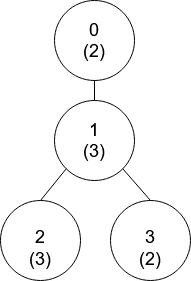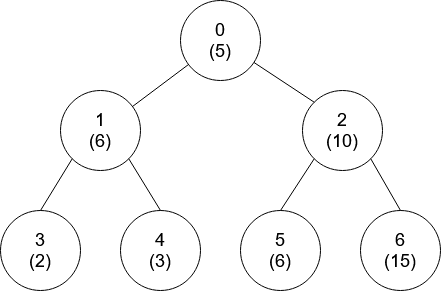LeetCode-in-Java
1766. Tree of Coprimes
Hard
There is a tree (i.e., a connected, undirected graph that has no cycles) consisting of n nodes numbered from 0 to n - 1 and exactly n - 1 edges. Each node has a value associated with it, and the root of the tree is node 0.
To represent this tree, you are given an integer array nums and a 2D array edges. Each nums[i] represents the ith node’s value, and each edges[j] = [uj, vj] represents an edge between nodes uj and vj in the tree.
Two values x and y are coprime if gcd(x, y) == 1 where gcd(x, y) is the greatest common divisor of x and y.
An ancestor of a node i is any other node on the shortest path from node i to the root. A node is not considered an ancestor of itself.
Return an array ans of size n, where ans[i] is the closest ancestor to node i such that nums[i] and nums[ans[i]] are coprime, or -1 if there is no such ancestor.
Example 1:

Input: nums = [2,3,3,2], edges = [[0,1],[1,2],[1,3]]
Output: [-1,0,0,1]
Explanation: In the above figure, each node’s value is in parentheses.
-
Node 0 has no coprime ancestors.
-
Node 1 has only one ancestor, node 0. Their values are coprime (gcd(2,3) == 1). - Node 2 has two ancestors, nodes 1 and 0. Node 1’s value is not coprime (gcd(3,3) == 3), but node 0’s value is (gcd(2,3) == 1), so node 0 is the closest valid ancestor.
-
Node 3 has two ancestors, nodes 1 and 0. It is coprime with node 1 (gcd(3,2) == 1), so node 1 is its closest valid ancestor.
Example 2:

Input: nums = [5,6,10,2,3,6,15], edges = [[0,1],[0,2],[1,3],[1,4],[2,5],[2,6]]
Output: [-1,0,-1,0,0,0,-1]
Constraints:
nums.length == n1 <= nums[i] <= 501 <= n <= 105edges.length == n - 1edges[j].length == 20 <= uj, vj < nuj != vj
Solution
import java.util.ArrayList;
import java.util.Arrays;
@SuppressWarnings({"unchecked", "java:S107"})
public class Solution {
private void dfs(
int[] v2n,
int[] v2d,
int depth,
int parent,
int node,
int[] ans,
int[] nums,
ArrayList<Integer>[] neighbors) {
int d = Integer.MIN_VALUE;
int n = -1;
int v = nums[node];
for (int i = 1; i <= 50; i++) {
if (v2n[i] != -1 && v2d[i] > d && gcd(i, v) == 1) {
d = v2d[i];
n = v2n[i];
}
}
ans[node] = n;
int v2NOld = v2n[v];
int v2DOld = v2d[v];
v2n[v] = node;
v2d[v] = depth;
for (int child : neighbors[node]) {
if (child == parent) {
continue;
}
dfs(v2n, v2d, depth + 1, node, child, ans, nums, neighbors);
}
v2n[v] = v2NOld;
v2d[v] = v2DOld;
}
private int gcd(int x, int y) {
return x == 0 ? y : gcd(y % x, x);
}
public int[] getCoprimes(int[] nums, int[][] edges) {
int n = nums.length;
ArrayList<Integer>[] neighbors = new ArrayList[n];
for (int i = 0; i < n; i++) {
neighbors[i] = new ArrayList<>();
}
for (int[] edge : edges) {
neighbors[edge[0]].add(edge[1]);
neighbors[edge[1]].add(edge[0]);
}
int[] ans = new int[n];
int[] v2n = new int[51];
int[] v2d = new int[51];
Arrays.fill(v2n, -1);
dfs(v2n, v2d, 0, -1, 0, ans, nums, neighbors);
return ans;
}
}

